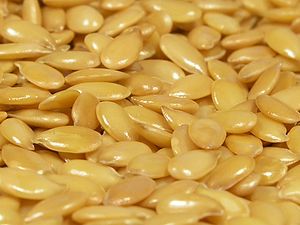 Image via Wikipedia
Image via WikipediaAs populations age, we not only deal with menopausal symptoms like hot flashes and night sweats, we increasingly have complaints of sleep issues and pain due to osteoarthritis. Over 20 million aging Americans suffer from osteoarthritis, and is reported to be second only to heart disease as a cause of work disability in men over 50. According to the Center for Disease Control, the direct and indirect costs are estimated to be approaching $90 billion. Elsewhere, the figures are equally worrying, with approximately seven million people in the UK alone are reported to have long-term health problems associated with arthritis.
Pharmaceutical solutions include non-steroidal anti-inflammatory drugs (NSAIDs), which are seen by many as daily necessity to control pain and allow people to carry out their everyday activities. Some NSAIDs, which are among the most frequently prescribed medications worldwide, have been linked with gastrointestinal toxicity, increased blood pressure, and increased risk of cardiovascular disease.
On the back of such undesirable side effects, natural or naturally sourced supplements are increasing. But how much science supports these alternatives?
Big hitters
The market is dominated by glucosamine and chondroitin . Amongst the most important studies supporting the apparent benefits of the ingredients was the $14 million Glucosamine/chondroitin Arthritis Intervention Trial (GAIT), sponsored by the National Institute of Health, which studied the effects of the supplements in 1583 people with osteoarthritis
The results, published in the New England Journal of Medicine indicated that the combination of glucosamine and chondroitin sulfate “significantly decreased” knee pain for people suffering from moderate-to-severe osteoarthritis.
However, in the general study population, which also included people with relatively mild pain, did not show any significant benefits, compared with placebo.
The second GAIT study, came up with different results, however. GAIT II reported in September 2008 that supplements of chondroitin and glucosamine, alone or in combination, had no positive affect joint health.
Almost 400 patients with osteoarthritis of the knee participated in the 24-month, double-blind, placebo-controlled study. The findings were published in the journal Arthritis & Rheumatism (doi: 10.1002/art.23973).
The GAIT II findings were dismissed by industry and academics as meaningless. Jason Theodosakis, assistant professor of medicine at the University of Arizona and author of a book on glucosamine and chondroitin, said the study should have been binned because the sample size was too small, the study length was too short, and the x-ray methodology was not sensitive enough to deliver meaningful measurements
Despite some conflicting results, consumers appear convinced of the ingredients’ benefits with US sales for these combined supplements valued at $810 million (€563 million) in 2005, according to Nutrition Business Journal.
While fish-sourced omega-3 fatty acids are better known for their cardiovascular benefits and help for menoopause symptoms, omega-3s have also been reported to benefit joint health. The anti-inflammatory activity of the fatty acids has been reported to behind many of the joint health benefits.
Omega-3-rich extracts from New Zealand green-lipped mussel , for example, were reported to show significant benefits in patients with osteoarthritis of the hip and knee. Korean scientists reported in 2003 that the Lyprinol-branded extract produced significant pain relief, and improved joint function, in 80 per cent of the participants after eight weeks of supplementation.
A recent study by Berlin-based CRO Analyze & Realize, reported that combining omega-3 fatty acids with glucosamine could be a better approach than using glucosamine alone.
The study, published in the journal Advances in Therapy, is said to be the first clinical trial to employ the combination of glucosamine omega-3 fatty acids in people suffering from osteoarthritis. UK-based Seven Seas funded the study.
The combination of glucosamine sulfate (1500 milligrams per day) and omega-3 fatty acids (providing 444 mg of fish oil, of which 200 mg were omega-3-fatty acids), was found to produce significant pain reduction, compared to glucosamine alone.

No comments:
Post a Comment